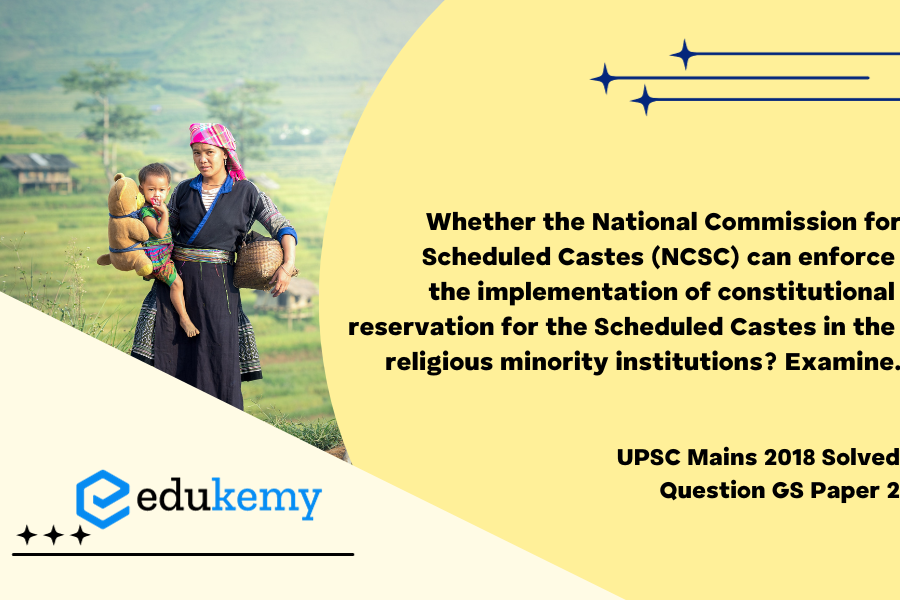The question of whether the National Commission for Scheduled Castes (NCSC) possesses the authority to compel the adherence to constitutional reservations for Scheduled Castes within religious minority institutions is a nuanced and contentious issue. The Indian Constitution guarantees affirmative action in the form of reservations for Scheduled Castes to ensure their social and educational upliftment. However, the application of these reservations in religious minority institutions introduces a complex interplay of constitutional rights and autonomy. The NCSC, tasked with safeguarding the interests of Scheduled Castes, faces the challenge of balancing these reservations with the autonomy granted to religious minority institutions. The examination of this matter requires a careful consideration of constitutional provisions, legal precedents, and the delicate equilibrium between preserving minority rights and promoting social justice. This essay will delve into these intricacies to assess whether the NCSC can effectively enforce constitutional reservations in religious minority institutions, navigating the fine line between constitutional obligations and institutional autonomy.
Tag: Appointment to various Constitutional posts, powers, functions, and responsibilities of various Constitutional Bodies.
Contents
Decoding the Question:
- In the Introduction, try to give a brief introduction about the National Commission for Scheduled Castes (NCSC).
- In Body,
- Briefly write about the religious minorities and their educational rights.
- Discuss the implementation of constitutional reservation for the Scheduled Castes in the religious minority institutions and the recent controversy.
- In Conclusion, try to summarize the answer.
Answer:
The National Commission for Scheduled Castes (NCSC) is a constitutional body in India set up by Article 338 of the Constitution to protect Scheduled Castes from being exploited and to promote and protect their social, educational, economic, and cultural interests. It is a group that gives advice and makes suggestions to help the scheduled castes improve their lives as a whole.

Functions of NCSCs:
- Investigate and monitor matters related to SCs
- Inquire into specific complaints
- Reporting to the President
- Participate and advise in planning
- Take measures for the protection and welfare
Religious Minorities and Rights of Educational Institutions:
- Minorities have the right to set up and run their schools: All minorities should have the right to set up and run their schools the way they want.
- If the government wants to buy the property of a minority educational institution, it should keep in mind that the fixed price should not hurt the rights of minorities.
- The state shall not treat any educational institution differently because it is run by a minority, whether that minority is based on religion or language.
- On the acquisition of property by the government, a fixed price should be settled in a way that does not deter the rights of minorities.
- The State should not discriminate among educational institutions. Minority educational institutions have more powers than other institutions in the appointment of staff, management, etc.
- These institutions can have reservations of up to 50% for the students of their community.
- Minority educational institutions are not required to keep up a reservation for SCs, STs, and OBCs as required to be done by other educational institutions.
Implementation of Reservation for the Scheduled Castes:
- As per the Constitution, the Commission cannot enforce the implementation of constitutional reservation for the Scheduled Castes in the religious minority institutions.
- Article 15(5) of the Constitution says that minority institutions under Article 30 shall be exempt from the Constitutional reservation; this provision was inserted in 2005 by the 93rd Constitutional amendment.
- The Supreme Court in the Ashok Thakur case (2008) upheld the validity of the 93rd Amendment Act. The court said that the exemption of minority educational institutions from the ambit of reservations is constitutionally valid as such institutions are a class by themselves and cater to the special needs of minorities. Their exemption is thus not violative of the right to equality.
- The Supreme Court in P.A. Inamdar vs. State of Maharashtra case (2006) also held that the policy of reservation to admit students in terms of employment does not apply to a minority institution.
- Recent Controversy: The demand for the Dalit quota in various minority-run institutions like Aligarh Muslim University (AMU), Jamia Millia Islamia University, etc., was a serious matter in front of NCSC. However, it does not have the authority for the implementation of Constitutional reservations for the Scheduled Castes in the religious minority institutions.
The Supreme Court said in the case of Inamdar vs. State of Maharashtra:
- A minority institution can’t use the policy of putting students on a waiting list. The policy of setting aside jobs for people from certain groups doesn’t apply to a minority institution.
The idea of making it a fundamental right in the constitution to protect the educational rights of minorities is not unfair to the wealthy classes, but it does give minorities a sense of security against what they see as a threat from the majority. The rights of religious or linguistic aided minority institutions in the administration of the institutions were absolute and the State could not compel them to implement its reservation policy; it should be done within the framework of the Constitution and the laws.
In case you still have your doubts, contact us on 9811333901.
For UPSC Prelims Resources, Click here
For Daily Updates and Study Material:
Join our Telegram Channel – Edukemy for IAS
- 1. Learn through Videos – here
- 2. Be Exam Ready by Practicing Daily MCQs – here
- 3. Daily Newsletter – Get all your Current Affairs Covered – here
- 4. Mains Answer Writing Practice – here


